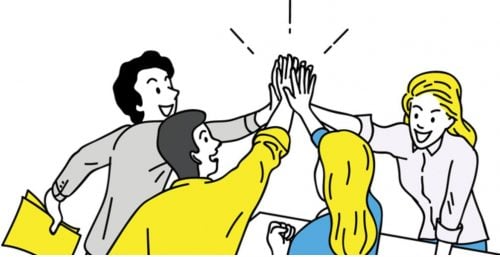Co-workers in a competitive market trust each other more than those in a non-competitive market, a new study found. In other words, working in a competitive industry generates a greater level of trust among workers in the same company. This is what researchers from Aix-Marseille University, Princeton University, and the University of British Columbia found.
They wrote about their study and findings in the journal Science Advances (citation below).
The researchers gathered and analyzed data from both Germany and the US across several manufacturing industries. They suggest that the more competitive an industry is, the more pro-social the behaviors of co-workers are. Sharing, volunteering, and cooperation, for example, are pro-social behaviors.
Trust among co-workers in competitive markets
Co-author Patrick Francois said:
“In competitive markets, employers unable to elicit such cooperative behavior are likely to be out-competed by those that are more successful in doing so. Pro-social behavior from employees makes them more productive, which is good for business.”
Francois is a Professor at the Vancouver School of Economics at the University of British Columbia (UBC) in Canada. He is also a Senior Fellow of the Institutions, Organizations, and Growth program of the Canadian Institute for Advanced Research.
The other two co-authors were Thomas Fujiwara and Tanguy van Ypsersele. Thomas Fujiwara is an Assistant Professor of Economics at Princeton University’s Department of Economics in the US. Tanguy van Ypersele is a Professor at Aix-Marseille University’s Faculty of Economics and Management in France.

Laboratory experiment
The researchers carried out a laboratory experiment which replicated industry data in a controlled environment. Participants had to play a public goods game, which is a standard of experimental economics.
In this game, participants decide secretly whether to make a financial contribution to a collective pool. If they don’t give the money, they keep it for themselves.
The study participants had to play the game twice. The first time, they played it in the traditional way. When they played the second time, on the other hand, the researchers manipulated the degree of competition across the groups.
The researchers wanted the experiment to mimic what happens in real life. In other words, they wanted the variation of competition that exists in the marketplace. In this context, the term ‘marketplace’ means the same as ‘market’ in the abstract sense of the word.
Therefore, study participants might be co-workers in more competitive or less competitive markets.
There was more pro-social behavior in the participants who played in the more competitive version of the game. In other words, in this simulation, pretend co-workers in a competitive industry had more pro-social behaviors than their counterparts in a less competitive industry.
What they saw in the experiment matched what they had observed in the German and US data.
The authors said that we still have a poor understanding of the origins of pro-social behavior among humans. However, they point to competition across companies as a potential factor supporting cultural evolution.
Citation
“The origins of human prosociality: Cultural group selection in the workplace and the laboratory,” Patrick Francois, Thomas Fujiwara, and Tanguy van Ypersele. Science Advances, 19 Sep 2018: Vol. 4, no. 9, eaat2201.
DOI: 10.1126/sciadv.aat2201.

